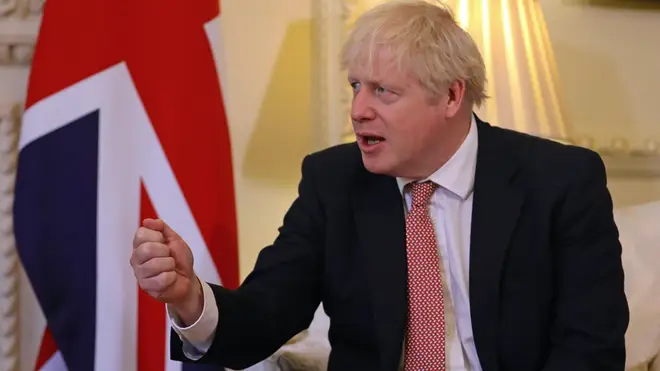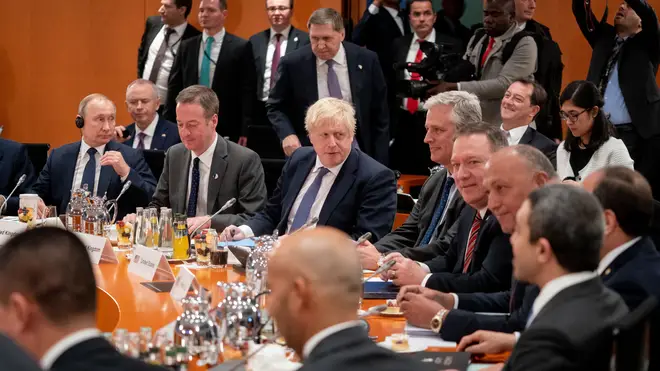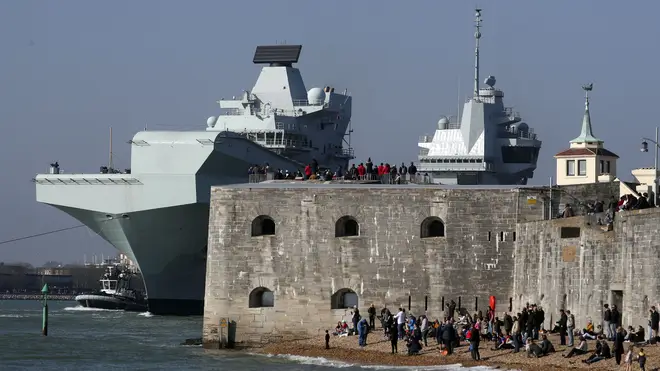
Oli Dugmore 4am - 7am
15 March 2021, 23:25 | Updated: 16 March 2021, 08:48

Boris Johnson will announce a radical new policy framework of "increased international activism" to counter growing threats to allied Western countries from states like Russia.
The Prime Minister will on Tuesday unveil the results of the Government's year-long Integrated Review of security, defence, development and foreign policy - described as the most radical reassessment of Britain's place in the world since the end of the Cold War.
The 100-page document - entitled Global Britain in a Competitive Age - will map out plans for the armed forces to adopt the latest cutting-edge technologies such as drones and artificial intelligence (AI), with a new focus on the future battlefields of space and cyber.
It will include the construction of a White House-style 'Situation Centre' in the Cabinet Office and a new Counter-Terrorism Operations Centre to improve the authorities' ability to respond to incidents.
At the same time it will mark a strategic "tilt" towards the Indo-Pacific region as ministers increasingly argue it is becoming the "geopolitical centre of the world".

The shift will be underlined by the deployment of the HMS Queen Elizabeth carrier strike group to the region on its maiden operation later this year.
Meanwhile, the PM is due to travel to India at the end of April on his first major international visit following Britain's withdrawal from the EU.
In a Commons statement, Mr Johnson is expected to argue that while Nato remains the bedrock of UK security in the Euro-Atlantic region, the country can no longer rely on an "increasingly outdated international" to protect its interests.
At a time when some countries are seeking to undermine the open and liberal international order which emerged following the Cold War, he is expected to say the UK needs to use "all the tools at our disposal" to ensure a world where democracies can still flourish.
He is expected to tell MPs: "I am profoundly optimistic about the UK's place in the world and our ability to seize the opportunities ahead.
"The ingenuity of our citizens and the strength of our Union will combine with our international partnerships, modernised armed forces and a new green agenda, enabling us to look forward with confidence as we shape the world of the future."
The publication of the review comes after the Prime Minister announced in November a £16.5 billion increase in defence spending over the next four years with the creation of an agency dedicated to artificial intelligence, and a "space command" capable of launching the UK's first rocket by 2022.

Boris Johnson says he has full confidence in Cressida Dick
The Government has also said it is planning a "cyber corridor" across the north of England, where the headquarters of the new National Cyber Force (NCF) will be based.
However, military chiefs have made clear the investment in new technologies will mean cuts to some "industrial age" capabilities.
The Army is expected to be the biggest loser with troop numbers expected to be slashed by more than 10,000, while its fleet of Challenger 2 main battle tanks is expected to be reduced by a third and the Warrior infantry fighting vehicle retired altogether.
The moves have alarmed some MPs, including Conservative chair of the Defence Committee Tobias Ellwood.
In the Commons on Monday he said the country was about to witness a "shocking reduction" in its conventional hard power in favour of new "niche capabilities".
"Yes, we must adapt to new threats but this does not mean that the old threats have disappeared," he said.
"Severe cuts to our infantry regiments, main battle tanks, armoured fighting vehicles and Hercules C130s (transport aircraft) will worry our closest allies and delight our competitors."

Shadow Foreign Secretary Lisa Nandy MP said: “The Government says Russia is the No. 1 threat to our security but it has refused to implement any of the recommendations of the Russia report, damaged relations with our NATO partners in Europe and its mismanagement of the defence budget has undermined the foundations of our defences.
“In a world where battlefields no longer have boundaries and we face the twin threats of state-based warfare and hybrid attacks, this lost decade has left our defences down in our own backyard.
“There is a yawning chasm between the Government’s words and its actions. It wants to uphold international law but repeatedly breaks it.
"It lauds the importance of conflict resolution and counter-terrorism while cutting those programmes in Syria and Iraq. It preaches peace in Yemen but sells arms to Saudi. It wants to build alliances but antagonises our allies. It wants to lead on climate change but has no plan for net zero.
“Britain needs a plan that leaves us secure and resilient at home, reliable and trusted abroad, by focusing on playing a leadership role in our own neighbourhood. Instead of a strategy we have a series of slogans that leave us woefully unprepared for the immediate challenges we face.”